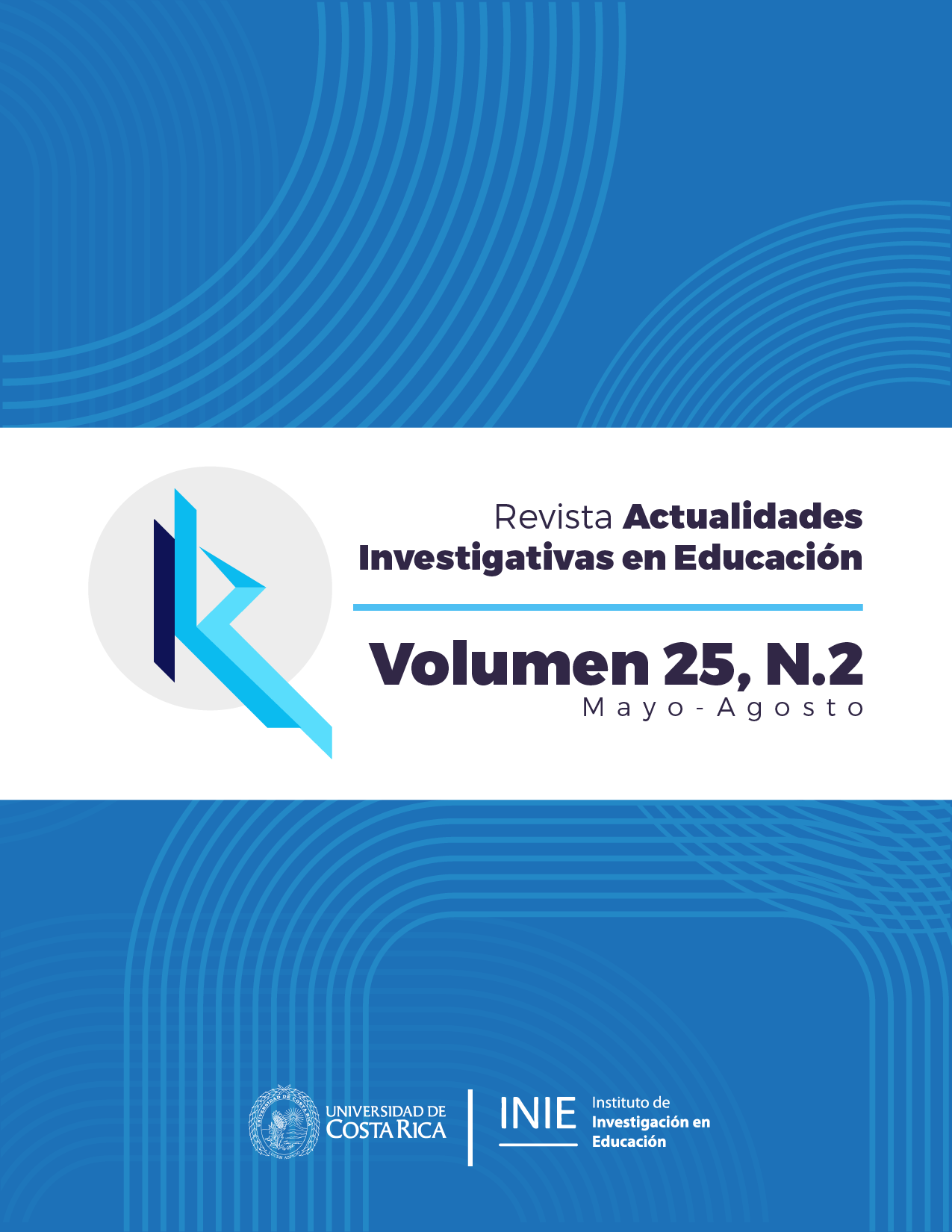Abstract
This study analyzes how Project-Based Learning (ABP) influences student engagement and learning in natural sciences from the students’ perspective. Conducted during the first semester of 2021 at an international school in Costa Rica, the research adopted a qualitative approach using the Participatory Action Research (PAR) method. Data from 39 students in grades 6 to 8 were collected through observations, field journals, questionnaires, and interviews, and analyzed using qualitative coding and thematic categorization, identifying patterns related to cognitive, emotional, and behavioral engagement. The results show high levels of engagement, with 87,5% of students participating more actively in scientific discussions during projects and 85% reporting a greater understanding of concepts. The study concludes that ABP is an effective strategy for fostering meaningful and motivating learning by enabling students to connect scientific concepts with real-world problems. Additionally, its implementation strengthens skills such as autonomy and collaboration. However, more structured planning is needed to address challenges related to time management and initial guidance in this pedagogical approach.
References
Ali, Sheeba Sardar. (2019). Problem Based Learning: A Student-Centered Approach. English language teaching, 12(5), 73-78. https://doi.org/10.5539/elt.v12n5p73
Ander-Egg, Ezequiel. (2003). Metodología y práctica del desarrollo de la comunidad. Buenos Aires: Lumen.
Barron, Brigid., y Darling-Hammond, Linda. (2016). Perspectivas y desafíos de los enfoques del aprendizaje basados en la indagación. En La naturaleza del aprendizaje: Usando la investigación para inspirar la práctica (pp. 158-183). OCDE, OIE-UNESCO, UNICEF. https://siteal.iiep.unesco.org/sites/default/files/sit_investigacion_pdf/1561.pdf
Belland, Brian Robert. (2021). Instructional Scaffolding in STEM Education: Strategies and Efficacy Evidence. Springer.
Buck Institute for Education. (2019). Essential Project Design Elements Checklist. PBLworks. https://my.pblworks.org/resource/document/pbl_essential_elements_checklist
Buck Institute for Education. (2023). Gold Standard PBL: Essential Project Design Elements. Gold Standard PBL. PBLworks. https://www.pblworks.org/blog/gold-standard-pbl-essential-project-design-elements
Camacho, Heilyn., Coto, Mayela., y Jørgensen, Kenneth Mølbjerg. (2018). How does organisational culture influence the process of implementing PBL? Journal of Problem Based Learning in Higher Education, 6(2), 32-57. https://doi.org/10.5278/ojs.jpblhe.v6i2.2140
Chipchase, Lucy., Davidson, Megan., Blackstock, Felicity., Bye, Ros., Clothier, Peter., Klupp, Nerida., Nickson, Wendy., Turner, Deborah., y Williams, Mark. (2017). Conceptualising and measuring student disengagement in higher education: A synthesis of the literature. International Journal of Higher Education, 6(2), 31-42. https://doi.org/10.5430/ijhe.v6n2p31
Culclasure, Brooke., Longest, Kyle., y Terry, Troy. (2019). Project-Based Learning (Pjbl) in Three Southeastern Public Schools: Academic, Behavioral, and Social-Emotional Outcomes. Interdisciplinary Journal of Problem-Based Learning, 13(2). Available at: https://doi.org/10.7771/1541-5015.1842
Efklides, Anastasia. (2011). Interactions of metacognition with motivation and affect in self-regulated learning: The MASRL model. Educational Psychologist, 46(1), 6-25. https://doi.org/10.1080/00461520.2011.538645
Flavell, John. (1979). Metacognition and cognitive monitoring: A new area of cognitive–developmental inquiry. American Psychologist, 34(10), 906–911. https://doi.org/10.1037/0003-066X.34.10.906
Fredricks, Jennife., Blumenfeld, Phyllis., y Paris, Alison. (2004). School engagement: Potential of the concept, state of the evidence. Review of educational research, 74(1), 59-109. https://doi.org/10.3102/00346543074001059
Guo, Pengyue., Saab, Nadira., Post, Lysanne., y Admiraal, Wilfried. (2020). A review of project-based learning in higher education: Student outcomes and measures. International Journal of Educational Research, 102, 101586. https://doi.org/10.1016/j.ijer.2020.101586
Hofstein, Avi., y Lunetta, Vincent. (2004). The laboratory in science education: Foundations for the twenty‐first century. Science education, 88(1), 28-54. https://doi.org/10.1002/sce.10106
Karaçalli, Saide., y Korur, Fikret. (2014). The effects of project‐based learning on students' academic achievement, attitude, and retention of knowledge: The subject of “electricity in our lives”. School Science and Mathematics, 114(5), 224-235. https://doi.org/10.1111/ssm.12071
Kemmis, Stephen., y McTaggart, Robin. (2005). Participatory action research: Communicative action and the public sphere. In Norman K. Denzin y Yvonna S. Lincoln (Eds.), The Sage handbook of qualitative research (3rd ed., pp. 559-603). Thousand Oaks, CA: Sage Publications.
Kemmis, Stephen., y McTaggart, Robin. (2014). The action research planner. Geelong, Victoria: Deakin University Press.
Larmer, John., Mergendoller, Joh., y Boss, Suzie. (2015). Setting the standard for project based learning. ASCD.
Lee, Silvia., Shih, Meliun., Liang, Jyh-Chong., y Tseng, Yi-Chen. (2021). Investigating learners' engagement and science learning outcomes in different designs of participatory simulated games. British Journal of Educational Technology, 52(3), 1197-1214. https://doi.org/10.1111/bjet.13067
Martinez, Corinne. (2022). Developing 21st century teaching skills: A case study of teaching and learning through project-based curriculum, Cogent Education, 9(1), 2024936. https://doi.org/10.1080/2331186X.2021.2024936
Mergendoller, John., Maxwell, Nan., y Bellisimo, Yolanda. (2006). The Effectiveness of problem-based instruction: A comparative study of instructional methods and student characteristics. Interdisciplinary Journal of Problem-Based Learning,1(2), 49–69. https://doi.org/10.7771/1541-5015.1026
Mioduser, David., y Betzer, Nadav. (2007). The contribution of project-based learning to high-achievers’ acquisition of technological knowledge and skills. International Journal of Technology and Design Education, 18, 59–77. http://dx.doi.org/10.1007/s10798-006-9010-4
Pérez Aguirre, Rosina., González Espada, Wilson., y Sarasola Bonetti, Marcos. (2022). Implementación del aprendizaje basado en proyectos en centros de educación media uruguayos. Pensamiento educativo, 59(2), 1-17. http://dx.doi.org/10.7764/pel.59.2.2022.10
Piaget, Jean. (1991). Seis estudios de psicología. Editorial Labor.
Pintrich, Paul. (2002). The Role of Metacognitive Knowledge in Learning, Teaching, and Assessing. Theory Into Practice, 41(4), 219–225. https://doi.org/10.1207/s15430421tip4104_3
Ravitz, Jason. (2010). Beyond changing culture in small high schools: Reform models and changing instruction with project-based learning. Peabody Journal of Education, 85(3), 290-312. https://www.jstor.org/stable/25759030
Saldaña, Johnny. (2009). The coding manual for qualitative researchers. Sage Publications.
Solís-Pinilla, Jaime. (2021). Aprendizaje basado en proyectos: una propuesta didáctica para el desarrollo socioemocional. Revista Saberes Educativos, (6), 76-94.
Summers, Emily., y Dickinson, Gail. (2012). A longitudinal investigation of project-based instruction and student achievement in high school social studies. Interdisciplinary Journal of Problem-Based Learning, 6(1), 82–103. https://doi.org/10.7771/1541-5015.1313
Tobin, Kenneth. (1990). Research on science laboratory activities: In pursuit of better questions and answers to improve learning. School Science and Mathematics, 90(5), 403-418. https://doi.org/10.1111/j.1949-8594.1990.tb17229.x
Virtue, Emily., y Hinnant-Crawford, Brandi. (2019). “We’re doing things that are meaningful”: Student Perspectives of Project-based Learning Across the Disciplines. Interdisciplinary Journal of Problem-Based Learning, 13(2). https://doi.org/10.7771/1541-5015.1809
Zapata Valverde, Yulissa Fernanda., Saavedra Ortiz, Vismar Leonardo., Vicente Merino, José Manuel., Sandoval Jarro, Brayan Daniel., y Abad Jiménez, Angelita Veloiz. (2024). El Impacto del Aprendizaje Basado en Proyectos en el Desarrollo de Habilidades de Pensamiento Crítico en Estudiantes de Bachillerato. Ciencia Latina Revista Científica Multidisciplinar, 8(5), 9380-9398. https://doi.org/10.37811/cl_rcm.v8i5.14325
##plugins.facebook.comentarios##

This work is licensed under a Creative Commons Attribution-NonCommercial-ShareAlike 4.0 International License.
Copyright (c) 2025 María Florencia Morado, Ayelén Eva Melo, Angela Jarman







